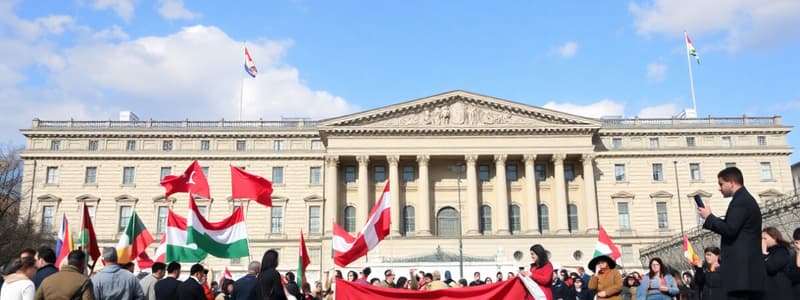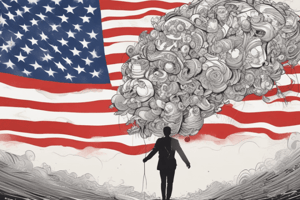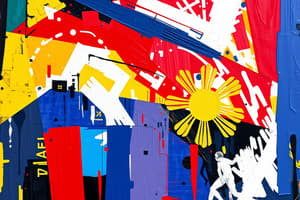Podcast
Questions and Answers
According to Ernest Renan, what is the primary defining characteristic of a nation?
According to Ernest Renan, what is the primary defining characteristic of a nation?
- A shared language and cultural heritage.
- A shared sense of history and tradition.
- A common political system and governance.
- A collective will to live together and shape a shared future. (correct)
Which of the following best reflects Herder’s perspective on the relationship between language and national identity?
Which of the following best reflects Herder’s perspective on the relationship between language and national identity?
- Language is a powerful tool that can be used to unite or divide people, depending on its use.
- Language is the most important aspect of national identity and should be preserved at all costs.
- Shared language is the foundation of cultural unity, but not inherently linked to political boundaries. (correct)
- Language is a tool for political control and is used by governments to maintain order.
What role did Fichte ascribe to education in the formation and maintenance of a nation?
What role did Fichte ascribe to education in the formation and maintenance of a nation?
- Education should be a tool for promoting social mobility and leveling the playing field for all members of society.
- Education should focus on instilling patriotism and national pride in students to promote unity and loyalty.
- Education should instill a shared sense of moral purpose and cultivate the national spirit through shared values and ideals. (correct)
- Education should teach children practical skills for contributing to the nation’s economic development.
Which of the following statements accurately reflects the contrasting views of Renan and Herder on the nature of a nation?
Which of the following statements accurately reflects the contrasting views of Renan and Herder on the nature of a nation?
In the context of both Renan and Fichte’s views, which of the following is LEAST likely to be considered a defining element of a nation?
In the context of both Renan and Fichte’s views, which of the following is LEAST likely to be considered a defining element of a nation?
What key factor did Ernest Gellner identify as driving the emergence of nationalism in the context of industrialization?
What key factor did Ernest Gellner identify as driving the emergence of nationalism in the context of industrialization?
Which scholar is cited in the text as providing empirical evidence for the link between modernization and national identity, specifically through the observation of linguistic homogenization in Zambia?
Which scholar is cited in the text as providing empirical evidence for the link between modernization and national identity, specifically through the observation of linguistic homogenization in Zambia?
What is a key difference between the modernist view of national identity and the perennialist/ethnosymbolism perspectives?
What is a key difference between the modernist view of national identity and the perennialist/ethnosymbolism perspectives?
Which of the following is NOT a key factor in the emergence of modern nationalism as identified by modernist scholars?
Which of the following is NOT a key factor in the emergence of modern nationalism as identified by modernist scholars?
The text mentions that some scholars who challenge modernist views cite religion as an important factor in the development of national identity. What is this approach known as?
The text mentions that some scholars who challenge modernist views cite religion as an important factor in the development of national identity. What is this approach known as?
What is the key role of the modern state in promoting nationalism?
What is the key role of the modern state in promoting nationalism?
How does Ernest Gellner's view of nationalism differ from Anthony D. Smith's?
How does Ernest Gellner's view of nationalism differ from Anthony D. Smith's?
What is the main argument that Gellner makes about the rise of nationalism?
What is the main argument that Gellner makes about the rise of nationalism?
What is the significance of the quote, "Nationalism is not the awakening of nations to self-consciousness; it invents nations where they do not exist"?
What is the significance of the quote, "Nationalism is not the awakening of nations to self-consciousness; it invents nations where they do not exist"?
What is the relationship between nationalism and cultural homogeneity?
What is the relationship between nationalism and cultural homogeneity?
What aspect of nationalism did Herder primarily emphasize?
What aspect of nationalism did Herder primarily emphasize?
Which statement best describes Fichte's contribution to nationalism?
Which statement best describes Fichte's contribution to nationalism?
What idea did Karl Deutsch propose regarding nationalism?
What idea did Karl Deutsch propose regarding nationalism?
Which group of scholars first addressed nationalism in political science journals?
Which group of scholars first addressed nationalism in political science journals?
What dual role of nationalism did Deutsch recognize?
What dual role of nationalism did Deutsch recognize?
Which of the following best encapsulates Fichte's view of a nation's purpose?
Which of the following best encapsulates Fichte's view of a nation's purpose?
According to Renan, what is the critical element in the formation of a national identity?
According to Renan, what is the critical element in the formation of a national identity?
How does Herder's concept of a nation primarily differ from that of Fichte?
How does Herder's concept of a nation primarily differ from that of Fichte?
Which statement best contrasts Renan's view of nationalism with that of the German Romantics?
Which statement best contrasts Renan's view of nationalism with that of the German Romantics?
What role does education specifically play in Fichte's view of nationalism?
What role does education specifically play in Fichte's view of nationalism?
According to Gellner, what is the primary function of nationalism in modern industrial societies?
According to Gellner, what is the primary function of nationalism in modern industrial societies?
What does Gellner mean when he states that 'nationalism invents nations where they do not exist'?
What does Gellner mean when he states that 'nationalism invents nations where they do not exist'?
According to Gellner's theory, how does the modern state contribute to the development of nationalism?
According to Gellner's theory, how does the modern state contribute to the development of nationalism?
In Gellner's perspective, what is the relationship between cultural homogeneity and the requirements of modern industrial societies?
In Gellner's perspective, what is the relationship between cultural homogeneity and the requirements of modern industrial societies?
In which way do Gellner’s views on nationalism diverge from other scholars mentioned in the text?
In which way do Gellner’s views on nationalism diverge from other scholars mentioned in the text?
According to Anthony D. Smith, what is the fundamental relationship between ethnic communities and modern nation-states?
According to Anthony D. Smith, what is the fundamental relationship between ethnic communities and modern nation-states?
According to Smith, what role do shared historical narratives play in the development of nationalism?
According to Smith, what role do shared historical narratives play in the development of nationalism?
Which of the following statements best encapsulates Anthony D. Smith's view on the origin of national identity?
Which of the following statements best encapsulates Anthony D. Smith's view on the origin of national identity?
According to Smith, what is the relationship between ethnic ties and national identity?
According to Smith, what is the relationship between ethnic ties and national identity?
What is the significance of Smith's statement that 'history is no sweetshop in which its children may ‘pick and mix’'?
What is the significance of Smith's statement that 'history is no sweetshop in which its children may ‘pick and mix’'?
Which of the following best describes the primary concern regarding Napoleon's impact on the German nation?
Which of the following best describes the primary concern regarding Napoleon's impact on the German nation?
How did Herder's approach to nationalism primarily differ from that of Fichte?
How did Herder's approach to nationalism primarily differ from that of Fichte?
According to the text provided, which of the following was NOT a major field of study initially researching nationalism?
According to the text provided, which of the following was NOT a major field of study initially researching nationalism?
What was a key element in Karl Deutsch's theory of nationalism?
What was a key element in Karl Deutsch's theory of nationalism?
In Karl Deutsch's view, what role do shared symbols, languages, and institutions play in nationalism?
In Karl Deutsch's view, what role do shared symbols, languages, and institutions play in nationalism?
Which statement best describes the timing of the surge of nationalism studies in political science?
Which statement best describes the timing of the surge of nationalism studies in political science?
According to the provided text, what was the primary basis for Karl Deutsch's analysis of nationalism?
According to the provided text, what was the primary basis for Karl Deutsch's analysis of nationalism?
How did Karl Deutsch perceive the dual nature of nationalism?
How did Karl Deutsch perceive the dual nature of nationalism?
Which of the following best describes the commonality in the 1983 studies of nationalism by Gellner, Anderson, and Hobsbawm & Ranger?
Which of the following best describes the commonality in the 1983 studies of nationalism by Gellner, Anderson, and Hobsbawm & Ranger?
According to Gellner's perspective, what was a key consequence of industrialization that contributed to the rise of nationalism?
According to Gellner's perspective, what was a key consequence of industrialization that contributed to the rise of nationalism?
Benedict Anderson's study of nationalism focused notably on which of the following?
Benedict Anderson's study of nationalism focused notably on which of the following?
Modernist scholars emphasize that nationalism is primarily?
Modernist scholars emphasize that nationalism is primarily?
Which of the following characteristics is most representative of perennialist or ethnosymbolist perspectives on nations and nationalism?
Which of the following characteristics is most representative of perennialist or ethnosymbolist perspectives on nations and nationalism?
The 'Warwick Debates' are described as exemplifying which of the following disputes?
The 'Warwick Debates' are described as exemplifying which of the following disputes?
What is the main focus of the 'organic intellectuals' mentioned in the context of primordialism?
What is the main focus of the 'organic intellectuals' mentioned in the context of primordialism?
How did the perennialists and ethnosymbolists differ from the German Romantics mentioned in the text?
How did the perennialists and ethnosymbolists differ from the German Romantics mentioned in the text?
What does the 'modernist' perspective on nationalism emphasize regarding the link between ethnic pasts and nations?
What does the 'modernist' perspective on nationalism emphasize regarding the link between ethnic pasts and nations?
What major factor has been shown to both create and strengthen nationalism?
What major factor has been shown to both create and strengthen nationalism?
What does constructivist theory emphasize regarding the formation of national identities?
What does constructivist theory emphasize regarding the formation of national identities?
According to research cited in the text, how is the emergence of nationhood best viewed?
According to research cited in the text, how is the emergence of nationhood best viewed?
Which of the following best describes the role of the state in the promotion of nationalism, as detailed in the text?
Which of the following best describes the role of the state in the promotion of nationalism, as detailed in the text?
What has recent research concluded regarding the inevitability of nations and nationalism?
What has recent research concluded regarding the inevitability of nations and nationalism?
The text mentions that some groups existed long before modern nations. What crucial distinction differentiates those groups from nations?
The text mentions that some groups existed long before modern nations. What crucial distinction differentiates those groups from nations?
What does the text imply about the relationship between pre-modern ethnic sensibilities and modern nations?
What does the text imply about the relationship between pre-modern ethnic sensibilities and modern nations?
Study Notes
Nations and Nationalism
- Nations are a spiritual and voluntary unity, based on a shared will to live together and commitment to the future.
- National identity is formed through memory and forgetting – selectively remembering some aspects of the past to preserve unity.
- Citizenship and civic engagement are crucial for a nation's existence, not based on ethnic/cultural purity, but on political participation.
- Nationalism is democratic and voluntary, not imposed by external forces.
The German Romantics
- Herder believed nations were defined by cultural and linguistic cohesion, not simply political borders.
- He thought nations emerged naturally from groups sharing language, history, and customs.
- Herder famously argued "The soul of a people is its language".
- Fichte viewed nations as moral and political communities, where individuals share a collective moral/ethical purpose.
- Education was vital in shaping national consciousness.
- The state's role was to protect and promote the national spirit.
Modernist Scholars
- These scholars view nationalism as a result of modernization – either inevitable or consciously developed by state elites.
- Nationalism emerged from the Industrial Revolution, distinct from premodern social identities.
- Examples of early modernist scholars include: Gellner, Anderson, and Hobsbawm.
Ernest Gellner (1925-1995)
- Industrialization required a standardized labor force, hence the need for standardized educational curricula promoting a unified "high culture".
- Modern industrial societies need cultural homogeneity(language, education, and work discipline) to function efficiently.
- Nationalism was a means to achieve this cultural unity.
- The modern state was instrumental in creating and promoting national unity.
- Nationalism is not the awakening of nations, but rather the invention of nations where they do not exist.
Benedict Anderson (1936-2015)
- Anderson investigated non-European cases and found the emergence of nationalism in colonized Latin America partially linked to the blocked social mobility of colonizing settlers.
- He looked at nationalism in non-European cases and explained the emergence of nationalism as a result of blocked social mobility of colonizing settlers in colonized Latin America.
Anthony D. Smith (1939-2016)
- Smith believed nations had deep continuity between ancient cultures and ethnic communities and modern nation-states.
- Nations and nationalisms are fundamentally ethnic.
- History is not a neutral tool, but a way to create links to shared historical memories and traditions tied to ethnic groups.
- Smith contended that there is a deep continuity between ancient cultures and ethnic communities, and modern nation-states. All nations and nationalisms are ultimately ethnic; history is not a neutral tool but a way to create links to shared memories and traditions.
The Warwick Debates
- The debates were between Gellner and Smith in 1983.
- They represented different intellectual traditions in the study of nationalism.
- Gellner focused on modernization as the cause of nationalism, while Smith emphasized pre-existing ethnic ties.
The Estonian Example
- Gellner countered that nations don't always have ethnic pasts and can emerge without established ethnic consciousness.
- Estonians, for example, created a nation without pre-existing ethnic identity in a short period.
The Current Consensus
- Recent research supports the modernist view of nationalism as emerging from specific historical circumstances.
- Nation-states are understood as an outcome of macro-historical, contingent social processes.
Constructivist Turn
- The constructivist perspective in politics extended to nationalism showing how wide-ranging shared identities like race, tribe, religion or geography could lead to nationalism.
- Groups motivated by political self-determination become nations.
- Such research showed that tribes, religious groups, clans, and kinship groups existed long before modern nations emerged and that they did not always become politically activated. Only those groups motivated by a desire for political self-determination could be understood as nations.
1983: A Breakthrough Year
- Influential studies on nationalism emerged in 1983: Gellner's Nations and Nationalism, Anderson's Imagined Communities, and Hobsbawm & Ranger's The Invention of Tradition.
- These works presented a conception of nation and nationalism as modern phenomena arising from industrialization, urbanization, print-capitalism, and resistance to colonialism.
Studying That Suits You
Use AI to generate personalized quizzes and flashcards to suit your learning preferences.



